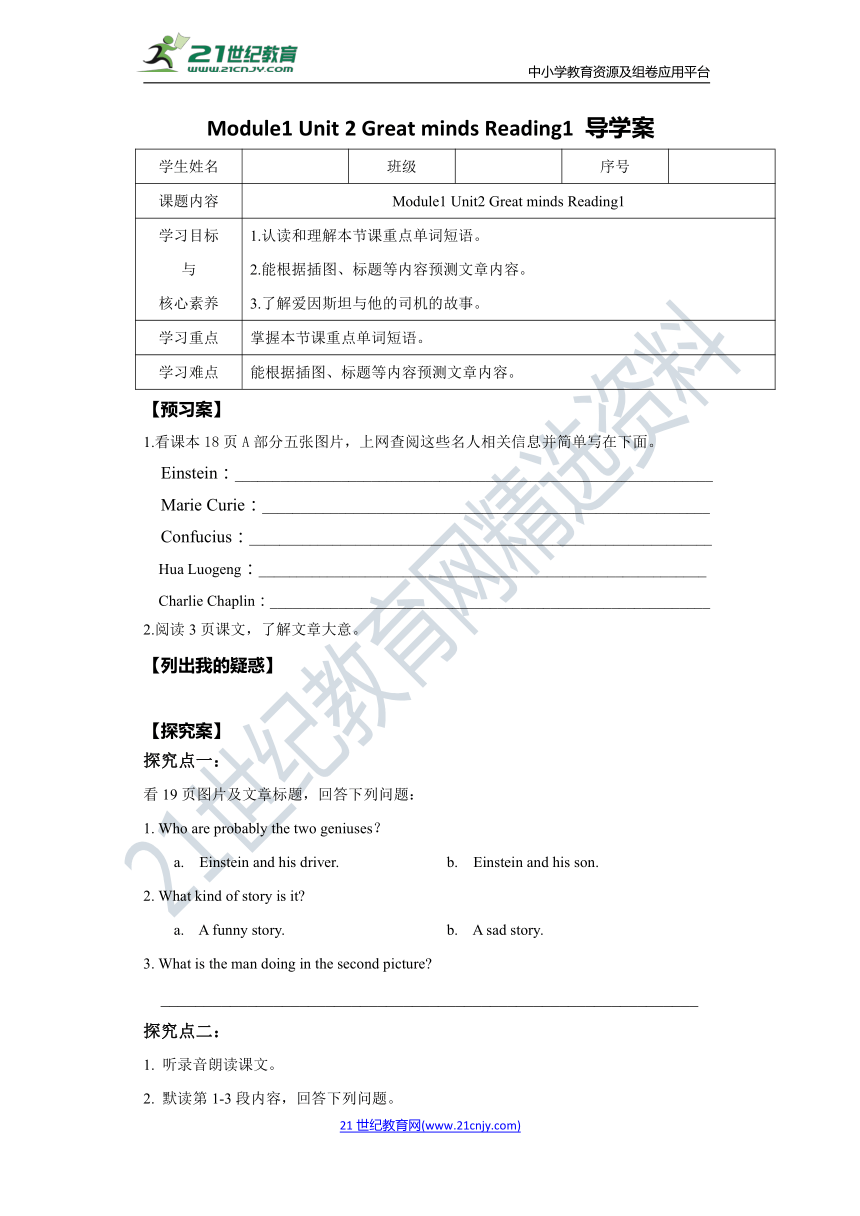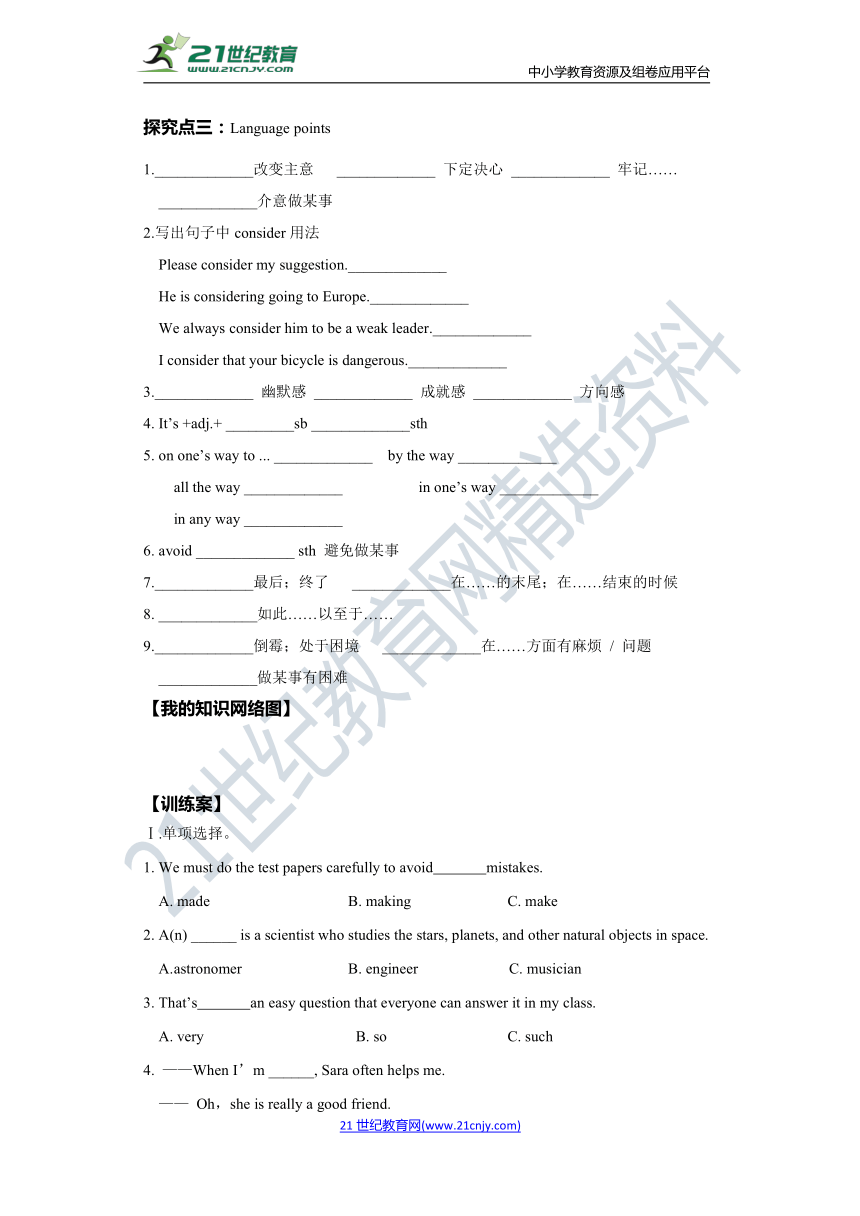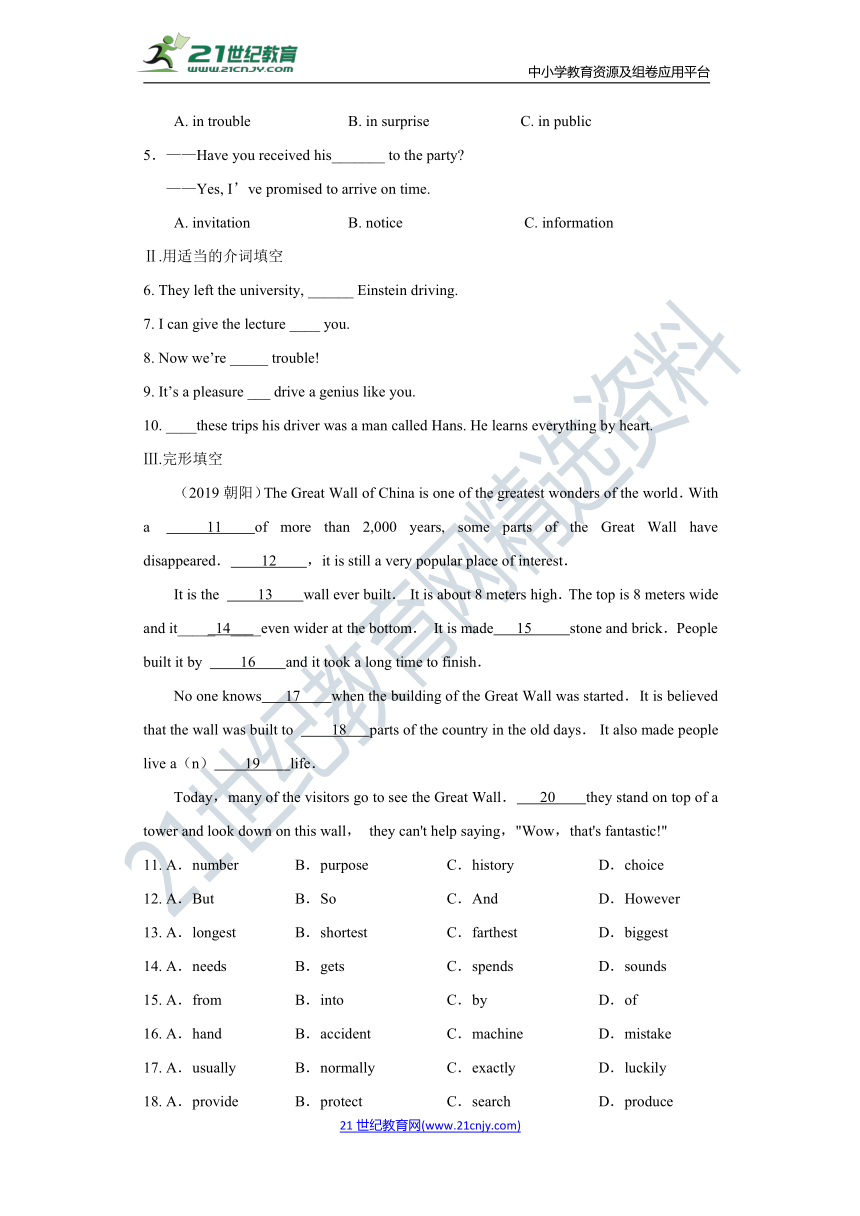Unit 2 Great minds 第1课时ReadingI导学案
文档属性
| 名称 | Unit 2 Great minds 第1课时ReadingI导学案 |  | |
| 格式 | zip | ||
| 文件大小 | 1.3MB | ||
| 资源类型 | 试卷 | ||
| 版本资源 | 牛津深圳版 | ||
| 科目 | 英语 | ||
| 更新时间 | 2020-07-06 17:41:08 | ||
图片预览




文档简介
中小学教育资源及组卷应用平台
Module1
Unit
2
Great
minds
Reading1
导学案
学生姓名
班级
序号
课题内容
Module1
Unit2
Great
minds
Reading1
学习目标与核心素养
1.认读和理解本节课重点单词短语。2.能根据插图、标题等内容预测文章内容。3.了解爱因斯坦与他的司机的故事。
学习重点
掌握本节课重点单词短语。
学习难点
能根据插图、标题等内容预测文章内容。
【预习案】
1.看课本18页A部分五张图片,上网查阅这些名人相关信息并简单写在下面。
Einstein:_______________________________________________________________
Marie
Curie:___________________________________________________________
Confucius:_____________________________________________________________
Hua
Luogeng:___________________________________________________________
Charlie
Chaplin:__________________________________________________________
2.阅读3页课文,了解文章大意。
【列出我的疑惑】
【探究案】
探究点一:
看19页图片及文章标题,回答下列问题:
1.
Who
are
probably
the
two
geniuses?
a.
Einstein
and
his
driver.
b.
Einstein
and
his
son.
2.
What
kind
of
story
is
it?
a.
A
funny
story.
b.
A
sad
story.
3.
What
is
the
man
doing
in
the
second
picture?
______________________________________________________________
探究点二:
听录音朗读课文。
2.
默读第1-3段内容,回答下列问题。
①
What
did
Einstein
often
receive?
______________________________________________________________________
②
On
these
trips,
what
did
his
driver
Hans
often
say
to
him?
______________________________________________________________________
③
One
evening,
when
Einstein
said
he
wanted
to
avoid
giving
his
lecture,
how
did
Hans
help
solve
this
problem?
______________________________________________________________________
④
Why
did
Hans
think
he
could
do
this?
______________________________________________________________________
3.
默读第4-5段内容,回答下列问题。
①
At
the
university,
what
did
Hans
do?
What
did
Einstein
do?
______________________________________________________________________
②
What
happened
before
Hans
left?
______________________________________________________________________
4.
默读其余段落,判断正误。
①
Hans
solved
the
man’s
question
in
a
clever
way.
②
When
Einstein
thought
they
were
in
trouble,
the
story
didn’t
take
an
unexpected
turn.
③
Einstein
stood
up
and
answered
the
question
perfectly.
④
We
can
infer
that
Einstein
had
a
sense
of
humour.
5.
根据故事情节,将下列句子排序。
(
)
Hans
asked
Einstein
to
answer
the
question.
(
)
A
man
asked
a
difficult
question.
(
)
Einstein
answered
the
question
perfectly.
(
)
Hans
offered
to
give
a
lecture
for
Einstein.
(
)
Einstein
felt
very
tired.
(
)
Einstein
was
invited
to
give
a
lecture
at
a
university.
(
)
The
audience
enjoy
the
lecture
given
by
Hans.
(
)
Hans
and
Einstein
left
the
university
happily,
with
Einstein
driving.
6.完成4页C1、C2练习题。
探究点三:Language
points
1._____________改变主意
_____________
下定决心
_____________
牢记……
_____________介意做某事
2.写出句子中consider用法
Please
consider
my
suggestion._____________
He
is
considering
going
to
Europe._____________
We
always
consider
him
to
be
a
weak
leader._____________
I
consider
that
your
bicycle
is
dangerous._____________
3._____________
幽默感
_____________
成就感
_____________
方向感
4.
It’s?+adj.+
_________sb?_____________sth
5.
on
one’s
way
to
...
_____________
by
the
way
_____________
all
the
way
_____________
in
one’s
way
_____________
in
any
way
_____________
6.
avoid
_____________
sth
避免做某事
7._____________最后;终了
_____________在……的末尾;在……结束的时候
8.
_____________如此……以至于……
9._____________倒霉;处于困境
_____________在……方面有麻烦
/
问题
_____________做某事有困难
【我的知识网络图】
【训练案】
Ⅰ.单项选择。
1.
We
must
do
the
test
papers
carefully
to
avoid
mistakes.
A.
made
B.
making
C.
make
2.
A(n)
______
is
a
scientist
who
studies
the
stars,
planets,
and
other
natural
objects
in
space.
A.
astronomer
B.
engineer
C.
musician
3.
That’s
an
easy
question
that
everyone
can
answer
it
in
my
class.
A.
very
B.
so
C.
such
4.
——When
I’m
______,
Sara
often
helps
me.
——
Oh,she
is
really
a
good
friend.
A.
in
trouble
B.
in
surprise
C.
in
public
5.——Have
you
received
his_______
to
the
party?
——Yes,
I’ve
promised
to
arrive
on
time.
A.
invitation
B.
notice
C.
information
Ⅱ.用适当的介词填空
6.
They
left
the
university,
______
Einstein
driving.
7.
I
can
give
the
lecture
____
you.
8.
Now
we’re
_____
trouble!
9.
It’s
a
pleasure
___
drive
a
genius
like
you.
10.
____these
trips
his
driver
was
a
man
called
Hans.
He
learns
everything
by
heart.
Ⅲ.完形填空
(2019朝阳)The
Great
Wall
of
China
is
one
of
the
greatest
wonders
of
the
world.With
a
11
of
more
than
2,000
years,
some
parts
of
the
Great
Wall
have
disappeared.
12
,it
is
still
a
very
popular
place
of
interest.
It
is
the
13
wall
ever
built.
It
is
about
8
meters
high.The
top
is
8
meters
wide
and
it_____14____even
wider
at
the
bottom.
It
is
made
15
stone
and
brick.People
built
it
by
16
and
it
took
a
long
time
to
finish.
No
one
knows
17
when
the
building
of
the
Great
Wall
was
started.It
is
believed
that
the
wall
was
built
to
18
parts
of
the
country
in
the
old
days.
It
also
made
people
live
a(n)
19
life.
Today,many
of
the
visitors
go
to
see
the
Great
Wall.
20
they
stand
on
top
of
a
tower
and
look
down
on
this
wall,
they
can't
help
saying,"Wow,that's
fantastic!"
11.
A.number
B.purpose
C.history
D.choice
12.
A.But
B.So
C.And
D.However
13.
A.longest
B.shortest
C.farthest
D.biggest
14.
A.needs
B.gets
C.spends
D.sounds
15.
A.from
B.into
C.by
D.of
16.
A.hand
B.accident
C.machine
D.mistake
17.
A.usually
B.normally
C.exactly
D.luckily
18.
A.provide
B.protect
C.search
D.produce
19.
A.smart
B.awful
C.terrible
D.peaceful
20.
A.Before
B.Unless
C.When
D.Though
Ⅳ.阅读理解
(2019荆门)In
the
eyes
of
many
foreigners,
Chinese
are
the
best
hosts
and
the
worst
guests
in
the
world.
And
western
hosts
sometimes
look
rude
(粗鲁的)
in
the
eyes
of
Chinese
guests.
It
is
because
the
guest-host
relationship
in
China
is
quite
different
from
that
in
some
western
countries.
In
China,
guests
are
almost
like
gods.
Whenever
I
enter
a
Chinese
friend’s
home,
there
is
always
fruit
on
the
table
for
me,
and
someone
is
quick
to
bring
me
a
cup
of
tea
or
water.
In
the
west,
generally
the
guest
is
not
a
god.
Acting
according
to
the
host’s
way
of
doing
things
is
usual
behavior
for
a
guest.
My
wife’s
mother,
a
very
kind
Chinese
lady,
doesn’t
smoke.
When
I
see
some
of
her
guests
smoking
in
her
house,
as
a
non-smoker,
I
feel
unhappy.
Usually,
I
want
to
stop
them
directly,
but
I
must
realize
that
in
China,
to
be
a
good
host,
she
must
not
do
that.
In
most
North
American
homes,
if
you
are
a
guest,
and
the
hosts
are
not
smokers,
you
should
not
smoke
in
their
house.
At
the
very
least,
you
should
ask,
“Is
it
OK
if
I
smoke?”
But
don’t
be
surprised
if
they
say,
“No,
you
can’t
smoke.”
In
my
culture,
if
you
smoke
in
their
house,
you
are
a
bad
guest,
but
if
they
don’t
allow
you
to
smoke
in
their
house,
they
are
not
rude
hosts.
In
a
word,
no
matter
where
you
are,
the
best
way
to
be
a
good
guest
is
to
adapt
to
(适应)
the
habits
of
your
hosts.
21.
When
a
western
guest
visits
a
Chinese
family,
he
often
________.
A.
buys
some
fruit
B.
brings
a
cup
of
tea
C.
smokes
D.
feels
like
a
god
22.
What
will
the
writer
probably
say
if
a
guest
wants
to
smoke
in
his
house?
A.
Let’s
smoke
together.
B.
Sorry,
you
can’t
smoke
here.
C.
Smoking
is
a
bad
habit.
D.
It’s
OK
if
you
smoke
here.
23.
What
can
be
learned
from
the
passage?
A.
A
friend
in
need
is
a
friend
indeed.
B.
Where
there
is
a
will,
there
is
a
way.
C.
When
in
Rome,
do
as
the
Romans
do.
D.
Actions
speak
louder
than
words.
24.
What
is
the
best
title
of
the
passage?
A.
The
Best
Hosts
B.
The
Best
Guests
C.
Different
Cultures
in
Different
Countries
D.
Different
Guest-host
Relationships
in
Different
Cultures
预习案答案:
1.
Einstein:
A
scientist
who
produced
the
Theory
of
Relativity.
People
regard
him
as
the
father
of
modern
physics.
Marie
Curie:She
was
a
physicist
and
chemist.
She
was
the
first
woman
to
win
a
Nobel
Prize.
Confucius:He
was
a
teacher
and
philosopher
in
the
Spring
and
Autumn
period
of
Chinese
history.
Hua
Luogeng:He
was
a
Chinese
mathematician.
He
is
famous
for
his
important
contributions
to
a
number
theory.
Charlie
Chaplin:He
was
a
comic
actor
and
film
director.
探究案答案:
探究点一:a,a
,He
is
giving
a
lecture/speech.
探究点二:
2.
①
He
often
received
invitations
to
explain
his
theories
at
different
universities.
②“It’s
a
pleasure
to
drive
a
genius
like
you.”
③
Hans
offered
to
give
the
lecture
for
him.
④
Because
he
had
listened
to
the
lecture
so
many
times
that
he
had
learnt
it
by
heart.
3.
①
Hans
was
guided
to
the
front
of
the
hall
and
Einstein
took
a
seat,
listened
to
Hans
give
his
lecture
without
difficulty,
and
joined
in
the
applause
at
the
end.
②
A
man
asked
a
question
so
difficult
that
Hans
had
no
idea
what
he
was
talking
about.
4.
TFTT
5.
6.
C1
pleasure,
avoid,
trust,
by
heart,without
difficulty,join
in
C2
tonight,
university,considered,
let,
down,
sense
探究点三:
1.
change
one’s
mind
make
up
one’s
mind
keep
in
one’s
mind
mind
doing
sth.
2.
(1)
consider
+
名词
/
代词
考虑……
(2)
consider
doing
sth.考虑做某事
(3)
consider
sb.
to
be认为某人……
(4)
consider
+
从句认为……
3.
a
sense
of
humour
a
sense
of
achievement
a
sense
of
direction
4.
It’s?+adj.+of
sb?to?do?sth
5.
on
one’s
way
to
...
在某人去……的路上
by
the
way
顺便说一下;顺便问问
all
the
way
一路上;自始至终
in
one’s
way
妨碍某人;用某人自己的方法
in
any
way
无论如何
6.
doing
7.
at
the
end
,
at
the
end
of
...
8.
so...that...
9.
(be)
in
trouble
have
trouble
with
…
have
trouble
(in)
doing
sth
训练案答案:
Ⅰ.1-5
BACAA
Ⅱ.
6.
with
7.
for
8.
in
9.
to
10.
On
Ⅲ.11-15
CDABD
16-20
ACBDC
Ⅳ.21-24
DBCD
【教与学的反思】
HYPERLINK
"http://21世纪教育网(www.21cnjy.com)
"
21世纪教育网(www.21cnjy.com)
Module1
Unit
2
Great
minds
Reading1
导学案
学生姓名
班级
序号
课题内容
Module1
Unit2
Great
minds
Reading1
学习目标与核心素养
1.认读和理解本节课重点单词短语。2.能根据插图、标题等内容预测文章内容。3.了解爱因斯坦与他的司机的故事。
学习重点
掌握本节课重点单词短语。
学习难点
能根据插图、标题等内容预测文章内容。
【预习案】
1.看课本18页A部分五张图片,上网查阅这些名人相关信息并简单写在下面。
Einstein:_______________________________________________________________
Marie
Curie:___________________________________________________________
Confucius:_____________________________________________________________
Hua
Luogeng:___________________________________________________________
Charlie
Chaplin:__________________________________________________________
2.阅读3页课文,了解文章大意。
【列出我的疑惑】
【探究案】
探究点一:
看19页图片及文章标题,回答下列问题:
1.
Who
are
probably
the
two
geniuses?
a.
Einstein
and
his
driver.
b.
Einstein
and
his
son.
2.
What
kind
of
story
is
it?
a.
A
funny
story.
b.
A
sad
story.
3.
What
is
the
man
doing
in
the
second
picture?
______________________________________________________________
探究点二:
听录音朗读课文。
2.
默读第1-3段内容,回答下列问题。
①
What
did
Einstein
often
receive?
______________________________________________________________________
②
On
these
trips,
what
did
his
driver
Hans
often
say
to
him?
______________________________________________________________________
③
One
evening,
when
Einstein
said
he
wanted
to
avoid
giving
his
lecture,
how
did
Hans
help
solve
this
problem?
______________________________________________________________________
④
Why
did
Hans
think
he
could
do
this?
______________________________________________________________________
3.
默读第4-5段内容,回答下列问题。
①
At
the
university,
what
did
Hans
do?
What
did
Einstein
do?
______________________________________________________________________
②
What
happened
before
Hans
left?
______________________________________________________________________
4.
默读其余段落,判断正误。
①
Hans
solved
the
man’s
question
in
a
clever
way.
②
When
Einstein
thought
they
were
in
trouble,
the
story
didn’t
take
an
unexpected
turn.
③
Einstein
stood
up
and
answered
the
question
perfectly.
④
We
can
infer
that
Einstein
had
a
sense
of
humour.
5.
根据故事情节,将下列句子排序。
(
)
Hans
asked
Einstein
to
answer
the
question.
(
)
A
man
asked
a
difficult
question.
(
)
Einstein
answered
the
question
perfectly.
(
)
Hans
offered
to
give
a
lecture
for
Einstein.
(
)
Einstein
felt
very
tired.
(
)
Einstein
was
invited
to
give
a
lecture
at
a
university.
(
)
The
audience
enjoy
the
lecture
given
by
Hans.
(
)
Hans
and
Einstein
left
the
university
happily,
with
Einstein
driving.
6.完成4页C1、C2练习题。
探究点三:Language
points
1._____________改变主意
_____________
下定决心
_____________
牢记……
_____________介意做某事
2.写出句子中consider用法
Please
consider
my
suggestion._____________
He
is
considering
going
to
Europe._____________
We
always
consider
him
to
be
a
weak
leader._____________
I
consider
that
your
bicycle
is
dangerous._____________
3._____________
幽默感
_____________
成就感
_____________
方向感
4.
It’s?+adj.+
_________sb?_____________sth
5.
on
one’s
way
to
...
_____________
by
the
way
_____________
all
the
way
_____________
in
one’s
way
_____________
in
any
way
_____________
6.
avoid
_____________
sth
避免做某事
7._____________最后;终了
_____________在……的末尾;在……结束的时候
8.
_____________如此……以至于……
9._____________倒霉;处于困境
_____________在……方面有麻烦
/
问题
_____________做某事有困难
【我的知识网络图】
【训练案】
Ⅰ.单项选择。
1.
We
must
do
the
test
papers
carefully
to
avoid
mistakes.
A.
made
B.
making
C.
make
2.
A(n)
______
is
a
scientist
who
studies
the
stars,
planets,
and
other
natural
objects
in
space.
A.
astronomer
B.
engineer
C.
musician
3.
That’s
an
easy
question
that
everyone
can
answer
it
in
my
class.
A.
very
B.
so
C.
such
4.
——When
I’m
______,
Sara
often
helps
me.
——
Oh,she
is
really
a
good
friend.
A.
in
trouble
B.
in
surprise
C.
in
public
5.——Have
you
received
his_______
to
the
party?
——Yes,
I’ve
promised
to
arrive
on
time.
A.
invitation
B.
notice
C.
information
Ⅱ.用适当的介词填空
6.
They
left
the
university,
______
Einstein
driving.
7.
I
can
give
the
lecture
____
you.
8.
Now
we’re
_____
trouble!
9.
It’s
a
pleasure
___
drive
a
genius
like
you.
10.
____these
trips
his
driver
was
a
man
called
Hans.
He
learns
everything
by
heart.
Ⅲ.完形填空
(2019朝阳)The
Great
Wall
of
China
is
one
of
the
greatest
wonders
of
the
world.With
a
11
of
more
than
2,000
years,
some
parts
of
the
Great
Wall
have
disappeared.
12
,it
is
still
a
very
popular
place
of
interest.
It
is
the
13
wall
ever
built.
It
is
about
8
meters
high.The
top
is
8
meters
wide
and
it_____14____even
wider
at
the
bottom.
It
is
made
15
stone
and
brick.People
built
it
by
16
and
it
took
a
long
time
to
finish.
No
one
knows
17
when
the
building
of
the
Great
Wall
was
started.It
is
believed
that
the
wall
was
built
to
18
parts
of
the
country
in
the
old
days.
It
also
made
people
live
a(n)
19
life.
Today,many
of
the
visitors
go
to
see
the
Great
Wall.
20
they
stand
on
top
of
a
tower
and
look
down
on
this
wall,
they
can't
help
saying,"Wow,that's
fantastic!"
11.
A.number
B.purpose
C.history
D.choice
12.
A.But
B.So
C.And
D.However
13.
A.longest
B.shortest
C.farthest
D.biggest
14.
A.needs
B.gets
C.spends
D.sounds
15.
A.from
B.into
C.by
D.of
16.
A.hand
B.accident
C.machine
D.mistake
17.
A.usually
B.normally
C.exactly
D.luckily
18.
A.provide
B.protect
C.search
D.produce
19.
A.smart
B.awful
C.terrible
D.peaceful
20.
A.Before
B.Unless
C.When
D.Though
Ⅳ.阅读理解
(2019荆门)In
the
eyes
of
many
foreigners,
Chinese
are
the
best
hosts
and
the
worst
guests
in
the
world.
And
western
hosts
sometimes
look
rude
(粗鲁的)
in
the
eyes
of
Chinese
guests.
It
is
because
the
guest-host
relationship
in
China
is
quite
different
from
that
in
some
western
countries.
In
China,
guests
are
almost
like
gods.
Whenever
I
enter
a
Chinese
friend’s
home,
there
is
always
fruit
on
the
table
for
me,
and
someone
is
quick
to
bring
me
a
cup
of
tea
or
water.
In
the
west,
generally
the
guest
is
not
a
god.
Acting
according
to
the
host’s
way
of
doing
things
is
usual
behavior
for
a
guest.
My
wife’s
mother,
a
very
kind
Chinese
lady,
doesn’t
smoke.
When
I
see
some
of
her
guests
smoking
in
her
house,
as
a
non-smoker,
I
feel
unhappy.
Usually,
I
want
to
stop
them
directly,
but
I
must
realize
that
in
China,
to
be
a
good
host,
she
must
not
do
that.
In
most
North
American
homes,
if
you
are
a
guest,
and
the
hosts
are
not
smokers,
you
should
not
smoke
in
their
house.
At
the
very
least,
you
should
ask,
“Is
it
OK
if
I
smoke?”
But
don’t
be
surprised
if
they
say,
“No,
you
can’t
smoke.”
In
my
culture,
if
you
smoke
in
their
house,
you
are
a
bad
guest,
but
if
they
don’t
allow
you
to
smoke
in
their
house,
they
are
not
rude
hosts.
In
a
word,
no
matter
where
you
are,
the
best
way
to
be
a
good
guest
is
to
adapt
to
(适应)
the
habits
of
your
hosts.
21.
When
a
western
guest
visits
a
Chinese
family,
he
often
________.
A.
buys
some
fruit
B.
brings
a
cup
of
tea
C.
smokes
D.
feels
like
a
god
22.
What
will
the
writer
probably
say
if
a
guest
wants
to
smoke
in
his
house?
A.
Let’s
smoke
together.
B.
Sorry,
you
can’t
smoke
here.
C.
Smoking
is
a
bad
habit.
D.
It’s
OK
if
you
smoke
here.
23.
What
can
be
learned
from
the
passage?
A.
A
friend
in
need
is
a
friend
indeed.
B.
Where
there
is
a
will,
there
is
a
way.
C.
When
in
Rome,
do
as
the
Romans
do.
D.
Actions
speak
louder
than
words.
24.
What
is
the
best
title
of
the
passage?
A.
The
Best
Hosts
B.
The
Best
Guests
C.
Different
Cultures
in
Different
Countries
D.
Different
Guest-host
Relationships
in
Different
Cultures
预习案答案:
1.
Einstein:
A
scientist
who
produced
the
Theory
of
Relativity.
People
regard
him
as
the
father
of
modern
physics.
Marie
Curie:She
was
a
physicist
and
chemist.
She
was
the
first
woman
to
win
a
Nobel
Prize.
Confucius:He
was
a
teacher
and
philosopher
in
the
Spring
and
Autumn
period
of
Chinese
history.
Hua
Luogeng:He
was
a
Chinese
mathematician.
He
is
famous
for
his
important
contributions
to
a
number
theory.
Charlie
Chaplin:He
was
a
comic
actor
and
film
director.
探究案答案:
探究点一:a,a
,He
is
giving
a
lecture/speech.
探究点二:
2.
①
He
often
received
invitations
to
explain
his
theories
at
different
universities.
②“It’s
a
pleasure
to
drive
a
genius
like
you.”
③
Hans
offered
to
give
the
lecture
for
him.
④
Because
he
had
listened
to
the
lecture
so
many
times
that
he
had
learnt
it
by
heart.
3.
①
Hans
was
guided
to
the
front
of
the
hall
and
Einstein
took
a
seat,
listened
to
Hans
give
his
lecture
without
difficulty,
and
joined
in
the
applause
at
the
end.
②
A
man
asked
a
question
so
difficult
that
Hans
had
no
idea
what
he
was
talking
about.
4.
TFTT
5.
6.
C1
pleasure,
avoid,
trust,
by
heart,without
difficulty,join
in
C2
tonight,
university,considered,
let,
down,
sense
探究点三:
1.
change
one’s
mind
make
up
one’s
mind
keep
in
one’s
mind
mind
doing
sth.
2.
(1)
consider
+
名词
/
代词
考虑……
(2)
consider
doing
sth.考虑做某事
(3)
consider
sb.
to
be认为某人……
(4)
consider
+
从句认为……
3.
a
sense
of
humour
a
sense
of
achievement
a
sense
of
direction
4.
It’s?+adj.+of
sb?to?do?sth
5.
on
one’s
way
to
...
在某人去……的路上
by
the
way
顺便说一下;顺便问问
all
the
way
一路上;自始至终
in
one’s
way
妨碍某人;用某人自己的方法
in
any
way
无论如何
6.
doing
7.
at
the
end
,
at
the
end
of
...
8.
so...that...
9.
(be)
in
trouble
have
trouble
with
…
have
trouble
(in)
doing
sth
训练案答案:
Ⅰ.1-5
BACAA
Ⅱ.
6.
with
7.
for
8.
in
9.
to
10.
On
Ⅲ.11-15
CDABD
16-20
ACBDC
Ⅳ.21-24
DBCD
【教与学的反思】
HYPERLINK
"http://21世纪教育网(www.21cnjy.com)
"
21世纪教育网(www.21cnjy.com)
